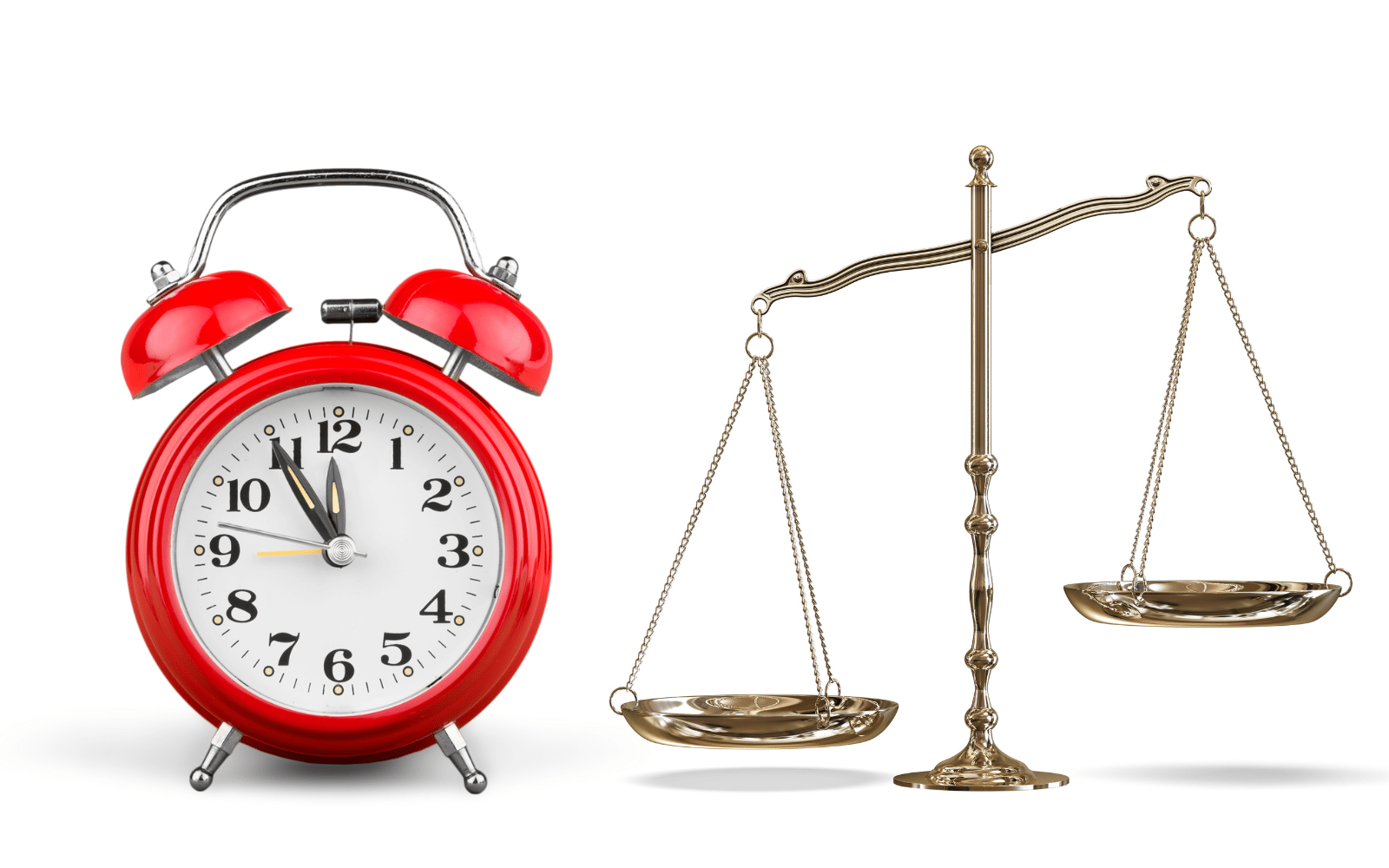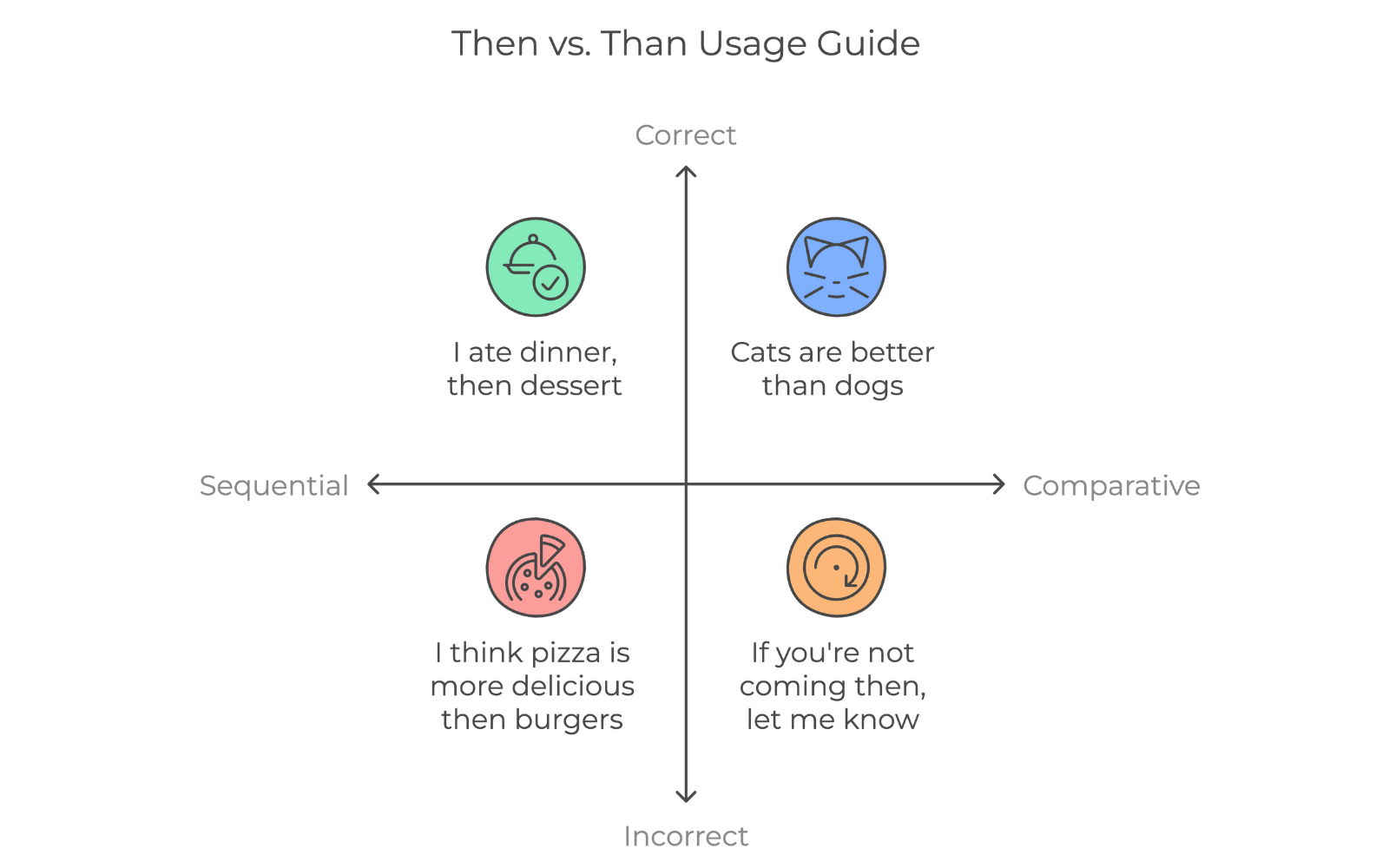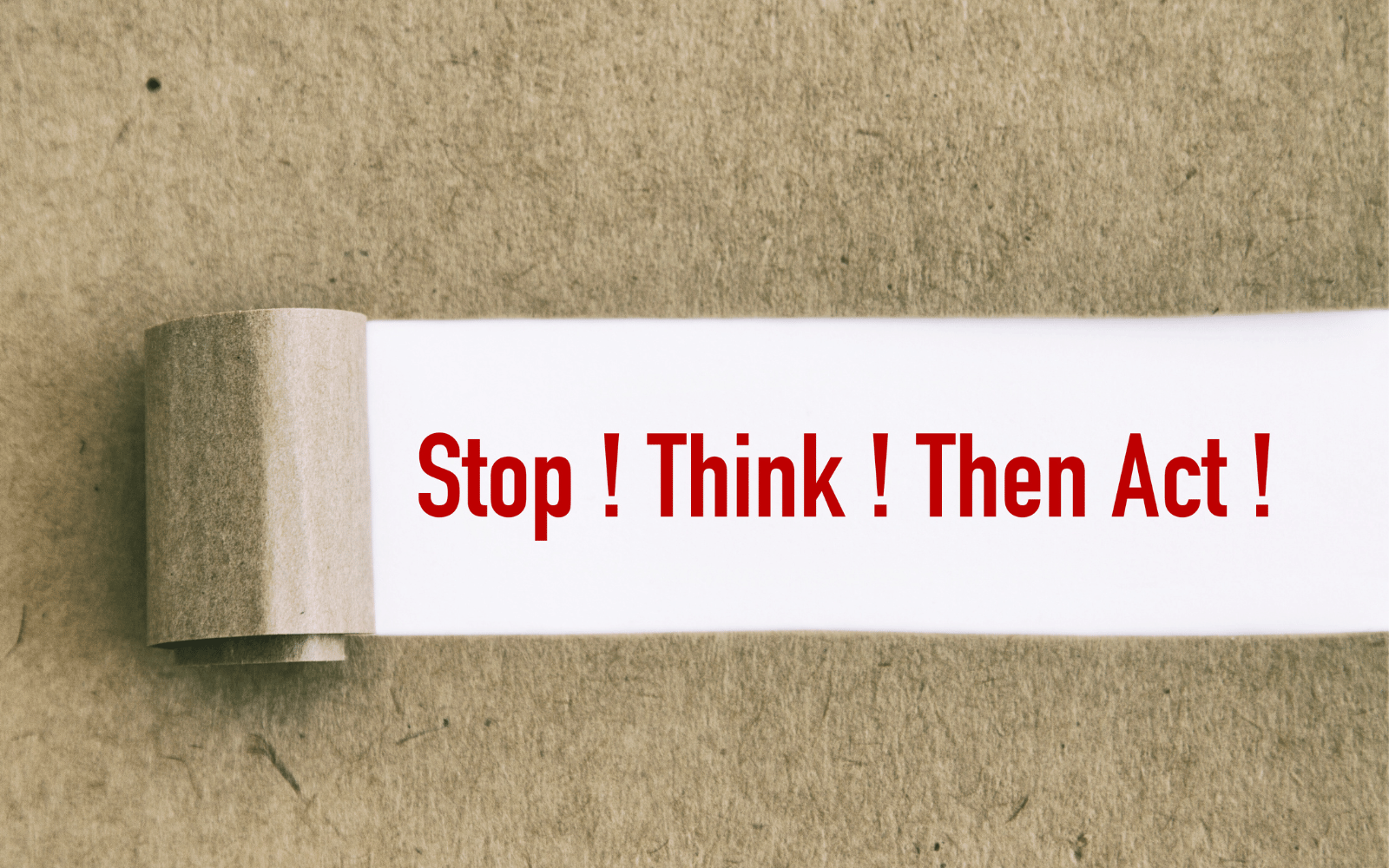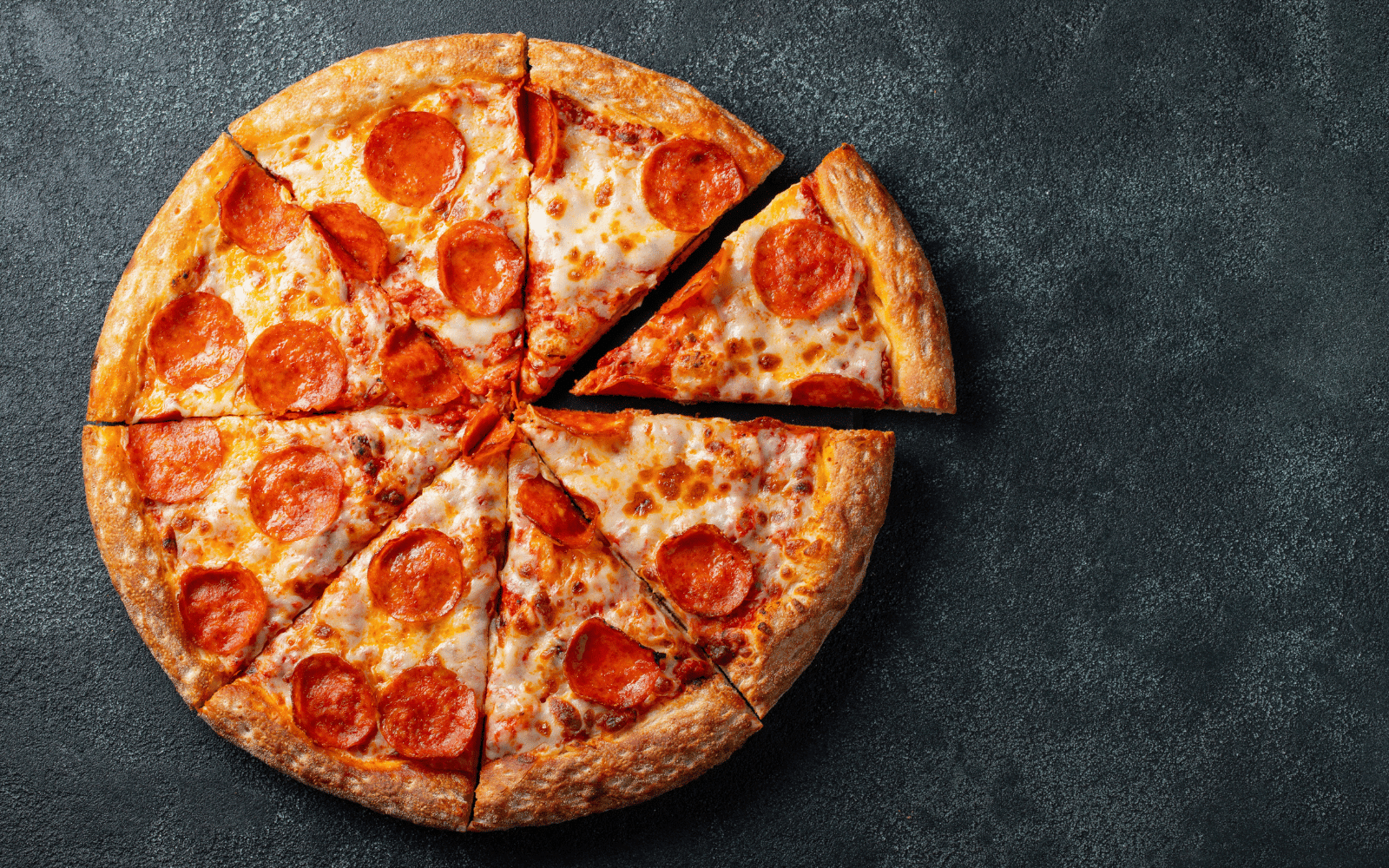How To Use Then vs. Than the Smart Way: Crack the Code

In the English language, then vs than are two words that often trip up even native English speakers.
Sure, they sound the same and nearly look identical, apart from a slight difference in spelling.
But these two words have very different meanings and uses.
Knowing the difference isn't just for grammar perfectionists and language geeks; it's key to making sure you're understood and taken seriously by your readers.
You want to be noticed for the right reasons.
So, let's break it down, clear the confusion, and get you using these words like a pro. No fancy talk, just the straight goods.
Hope this image below helps kick things off!

When to use "then"
When it comes to "then," think of it as the time traveler of the English language. It's all about what happens next, or what happened when, and events in time.
"Then" is your go-to when you're telling a story or laying out steps. It's the word that keeps everything in line like dominoes ready to topple in order.
For example, if you say, "I ate my dinner, then I had dessert," you're using "then" to show the order of events. First comes the meal, then the sweet treat. Simple, right?
Or, let's say you're giving instructions: "Turn left, then go straight." "Then" helps to make sure nobody ends up in a lake instead of at the party.

Here's a tip to keep "then" straight: If you can replace it with "next" or "after that" and your sentence still makes sense, you're on the right track.
Remember, "then" is all about timing. If you're not talking about when things happen, "then" probably isn't the word you're after.
So, next time you're jotting down directions or telling a friend about your day, let "then" guide you. It's the trusty sidekick for all things sequential and indicates a relationship with time.
No fancy language needed, no fluff, just good old-fashioned order, free from grammar errors.

Examples of "Then" in popular phrases
There are plenty of examples of the use of "then" in popular phrases.
Here are a few of our favourites to help you use correct phrases.
- "Back then, things were different."
- "If you're going to the store, then I'll come along too."
- "Think first, then act."
- "We'll have dinner, and then we can watch a movie."
- "First things first, then we'll tackle the rest."
- "I studied hard for the exam, and then I passed with flying colors."
- "If it rains, then we'll have to cancel the picnic."
- "She smiled, and then I knew everything was okay."
- "Finish your homework, then you can play video games."
- "He was young then and full of dreams."

When to use "than"
Now, let's tackle "than," the comparison champ of the English language. Unlike its time-keeping cousin "then," "than" is all about measuring up, sizing down, and weighing options.
"Than" steps into the ring when you're comparing one thing to another. It's the word that helps you tell the world what's bigger, better, or maybe just more bizarre.
For instance, if you're arguing about pets and say, "Cats are better than dogs," you're throwing "than" into the mix to compare your love for felines over canines.
Or maybe you're talking sizes, like, "This pizza is bigger than my appetite."
In that case, "than" is your go-to for highlighting the mismatch between the meal and your munching capacity.

Here's a handy tip: If you're stacking things up against each other, and words like "bigger," "better," or "more" pop up, "than" is likely your word.
Remember, "than" is the sidekick for comparisons. No time travel involved, just good old-fashioned this-versus-that.
So next time you're sizing up your lunch or debating superheroes, let "than" help you make your point. Just keep it clear, keep it simple, and let the comparisons roll.
Examples of "Than" in popular phrases
The examples below show how "than" is key in drawing distinctions and making choices clear.
- "Better late than never.
- "More often than not, things work out."
- "Easier said than done."
- "Actions speak louder than words."
- "Closer than you think."
- "Cheaper than dirt."
- "Faster than a speeding bullet."
- "Smarter than the average bear."
- "Stronger than steel."
- "Sweeter than ice cream."

Common Mistakes to Avoid
English grammar can be tricky, especially with words like "then" and "than" that can easily mix you up.
And the rules apply for everything from academic writing, to formal writing, to informal writing.
Let's sort out these common mix-ups and make things easier for you.
Confusing Sequence with Comparison
One of the most frequent slip-ups is using "then" when you mean "than," and vice versa.
Remember, if you're comparing, it's "than" you want. If you're talking about time or sequence, "then" is your friend.
For example, saying "I think pizza is more delicious then burgers" mixes up the sequence with comparison.
What you're really looking for is "than" to make that comparison shine: "I think pizza is more delicious than burgers."
And so you've got the grammar correct.
But if you think pizza is more delicious than burgers, you're wrong. Everyone knows a delicious cheeseburger is the best.

Misplacing "then" in a Sentence
Another common mistake is misplacing "then" in a sentence, which can make your message confusing to anyone trying to read it.
A good rule of thumb is to ensure "then" follows directly after the clause it's related to.
For example, "If you're not coming then, let me know" might confuse readers.
A clearer approach is, "If you're not coming, then let me know."
Frequently Asked Questions
Is it Rather Then or Rather Than?
Use "rather than" when comparing two options. "Then" is used for time, so "rather than" is correct when indicating a preference between choices, not sequencing events.
Is it Later Then or Later Than?
"Later than" is correct when comparing times or events. "Then" refers to sequence, so use "later than" to compare something occurring after a specific time.
Is it Earlier Than or Earlier Then?
"Earlier than" is used for comparisons involving time. "Then" indicates sequence. Therefore, when comparing events in time, "earlier than" is the correct choice.
Is it Better Than or Better Then?
"Better than" is correct when comparing two things. "Then" relates to time, so use "better than" to indicate a preference or superior option in comparisons.
Is it More Than or Then?
"More than" is correct for comparisons, indicating a greater amount or degree. "Then" is used for sequencing, so "more than" should be used when comparing quantities or extents.
Is it Less Then or Less Than?
"Less than" is used for comparisons, indicating a smaller amount or degree. "Then" is about time or sequence, so "less than" is correct for comparing quantities.
Is it Well Then or Well Than?
"Well then" is used to transition or respond in conversation, not for comparisons. "Than" is for comparisons. Use "well then" as a phrase to move forward or conclude a discussion.
Can You Start a Sentence With Then?
Yes, you can start a sentence with "then" when it refers to time or sequence, especially in narrative writing or instructions. It helps indicate the next step or part of a story.
Can you start a sentence with than?
Starting a sentence with "than" is uncommon because it's used for comparisons. If you see it starting a sentence, either it's a mistake or it is being used for emphasis, stylistically. It would not be grammatically correct.
Final Thoughts on Then vs. Than
Understanding the difference between 'then' and 'than' is more crucial than you might think; learn it, and then watch your writing improve.
Whether crafting an email, acing an essay, or just chatting with friends, mastering these two little words can make a big difference in clarity and precision.
So, keep these tips in mind, and watch your language skills shine.
And if you want help along the way - feel free to get in touch! We're here to help.
Blog
Let’s grow your online visibility together!
Join our newsletter for actionable tips and checklists!
Contact Us
You can also find us here:




